National Farmer Day: Making Integrated Farming
For more than 30 years, the farmer community in Sendang Pasir (Bali) never found a clear status for the land they've maintained for years. However, the Right to Cultivate (HGU) from PT. Margarana ended on December 31, 2005. Then the Supreme Court's number 591 PK/Pdt/2018 on August 10, 2010, came out but didn't relieve Sendang Pasir farmer.
Despite many challenges that befell the Sendang Pasir farmers, this has not dampened their spirit to fight for their land rights. Most of them are members of the Suka Makmur Farmers Union (SPSM), which for decades has sought various steps through legal ways and strengthening networks with the community to maintain their struggle. Therefore, on September 24, 2021, the Suka Makmur Farmers Union, together with the local community, held various activities to strengthen networks and voice their demands in the "Indonesian Farmers' Conference: True Agrarian Reform, the Way of Farmers' Welfare" to commemorate National Farmers Day (HTN).
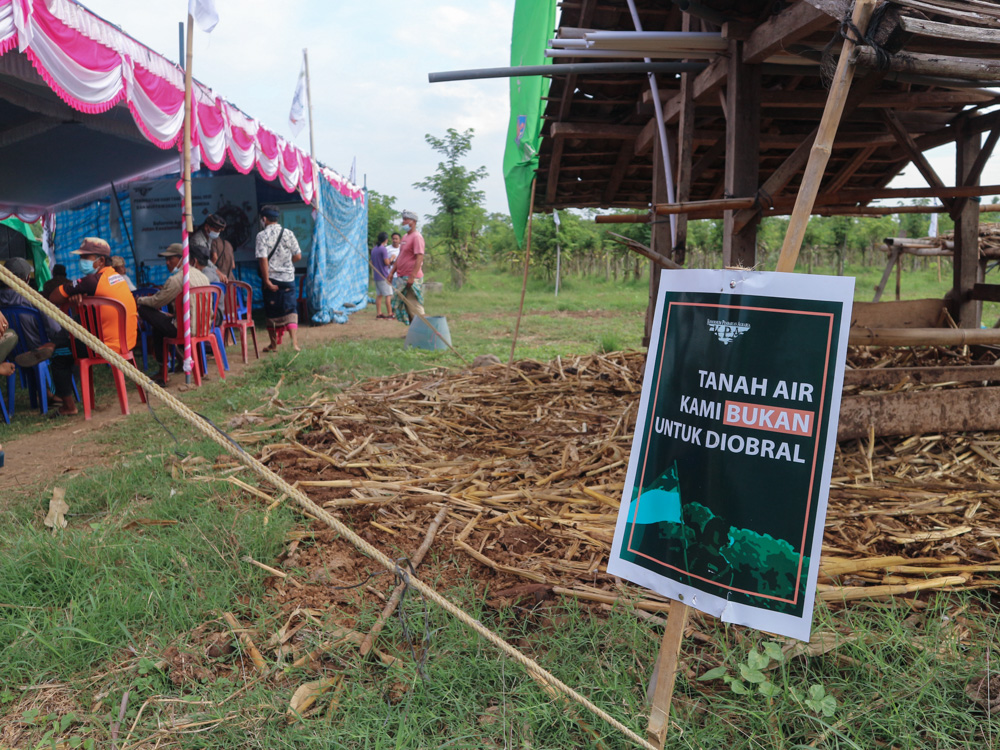
One of the posters display at National Farmers Day 2021 in Sendang Pasir, Pemuteran (Foto: Gusti Diah)
In this event, there are several activities, including 1) Inauguration of recharge wells and monitoring wells in collective gardens; 2) planting together in collective gardens and coastal areas; 3) HTN online meeting with KPA networks throughout Indonesia as well as speeches from representatives of farmers' unions; and 4) Discussion on Bali Water Protection (BWP) related to the integration of agriculture with water resources for resilience and self-reliance of farmers. "The purpose of the 61st HTN is to build critical awareness and togetherness among farmers in obtaining ownership rights to land," said Indrawati from the Bali Agrarian Reform Consortium (KPA).
Various elements of society were also involved in this event as a form of support for the struggle of the Suka Makmur Farmer Union. Starting from the arts community, university students, KPA Bali, and IDEP Foundation. The solidarity also helped to make the National Farmers Day celebration successful.
Inauguration of Recharge and Monitoring Wells
Right at 08.00 WITA, the event began with the traditional inauguration of recharge and monitoring wells. This procession is a form of community gratitude for water. Because without water, agriculture won't be able to run. Both wells are part of the collaboration between IDEP Foundation with farmers' union who formed in 1993.
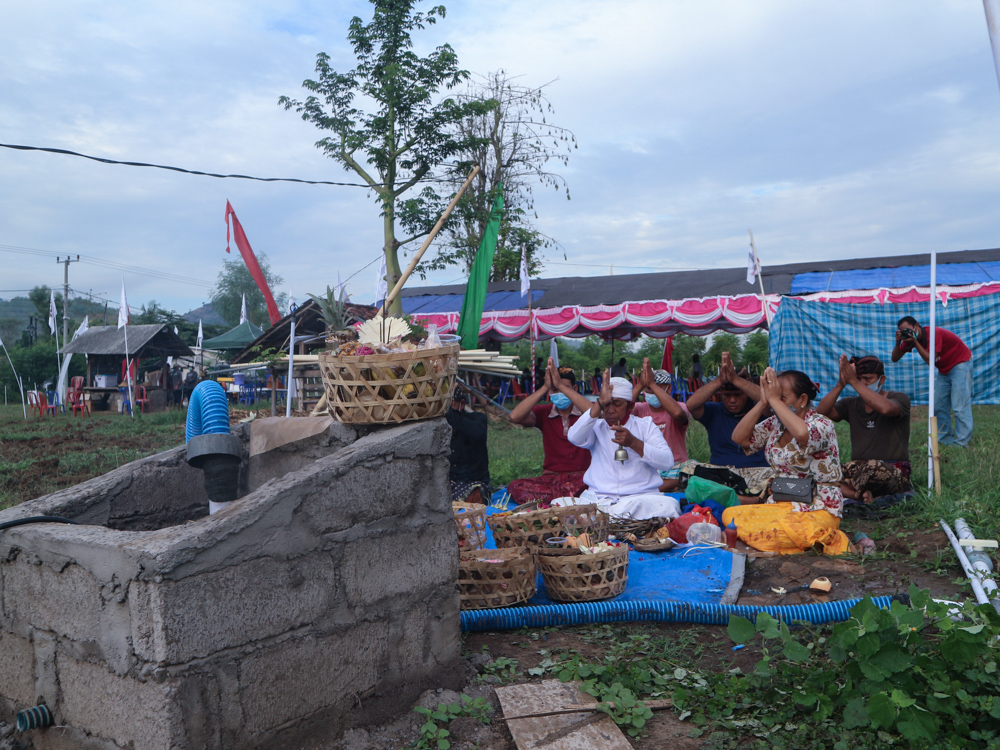
Traditional inauguration of recharge and monitoring wells (Foto: Gusti Diah)
The presence of Monitoring and Recharge Wells is part of Bali Water Protection's efforts to build awareness about seawater intrusion in Pemuteran. Besides many tourism accommodation industries in Pemuteran use groundwater, agriculture also uses groundwater because this ex-HGU land doesn't receive city-owned water company (PDAM). "We use this collective garden as a model. When we collect water, we have to be responsible by balancing it with recharge wells," said Putu Bawa, Manager of Bali Water Protection, IDEP Foundation.
The union also welcomes the wells' construction because both have important agricultural and environmental sustainability functions. Monitoring wells are designed to monitor underground water fluctuations. Besides being used by farmers, this well is also used to see how high the groundwater level is. After that, recharge wells were built to fill water back underground, thereby minimizing seawater intrusion. Besides collective garden, BWP also makes recharge wells at several points around Pemuteran Village, namely at Village Office and School.
SPSM is currently undertaking water 'saving' efforts, starting from changing the watering system. "For watering, farmers here previously used a piped system, which was wasteful, a lot of water wasted," said Roberto Hutabarat, an environmental activist who has been accompanying the farmers since 1993.
Rasik from the Suka Makmur Farmers Union also acknowledged the shortcomings of the piped system. Besides being wasteful, this system has also drained a lot of energy. Farmers not only have to make long water route but also have to connect and shift pipes. They need to monitor the flow of water until the watering process ends. For this reason, in their collective garden, this farmer group then switched to trying a sprinkler watering system. "We made a breakthrough by using this sprinkler, so it doesn't waste it; water doesn't flow everywhere," explained Rasik. He also added that "it is true that more capital is added, but not tiring and more saving in the future."
Besides changing the watering system, farmers also started changing their farming system, which previously used many chemical products, and now trying to implement the organic system. "When we talk about saving water for farmers, it's not only 'saving water by using enough water' but can be by changing the planting systems," said Bawa.
The experiment of changing planting systems is also slowly being accepted by farmers to minimize water use. Rasik also saw the comparison. When they manage their garden without chemicals, water is not absorbed immediately. Meanwhile, when the garden uses too many chemicals, the water absorbs very quickly and makes the soil dry. "When we give chemical fertilizer [urea] to our land, it dries easily," said Rasik.
In addition, the use of herbicides also has an impact on soil conditions. "If we use grass poison [herbicides], the land will also be damaged, rusty, and cracked," added the farmer who has repeatedly met the government to fight for his rights.
Building Integrated Farming
Alternative to minimize grass growth is to use a more natural method, which is cutting the grass. The grass will later be used as livestock feed. This effort is a step to build more integrated farming. "So in this collective garden, there are food and feed crops, livestock, water, nurseries, composting area, and biogas," said Roberto.
The presence of livestock on this collective land is part of the IDEP program related to livestock cooperatives. It calls integrated because through livestock it will produce manure which is used as compost and biogas, then the compost is also used for nurseries and can be planted. "This livestock are given to unions, and they will select ten beneficiaries in the category of members who are having school children," explained Rasik.
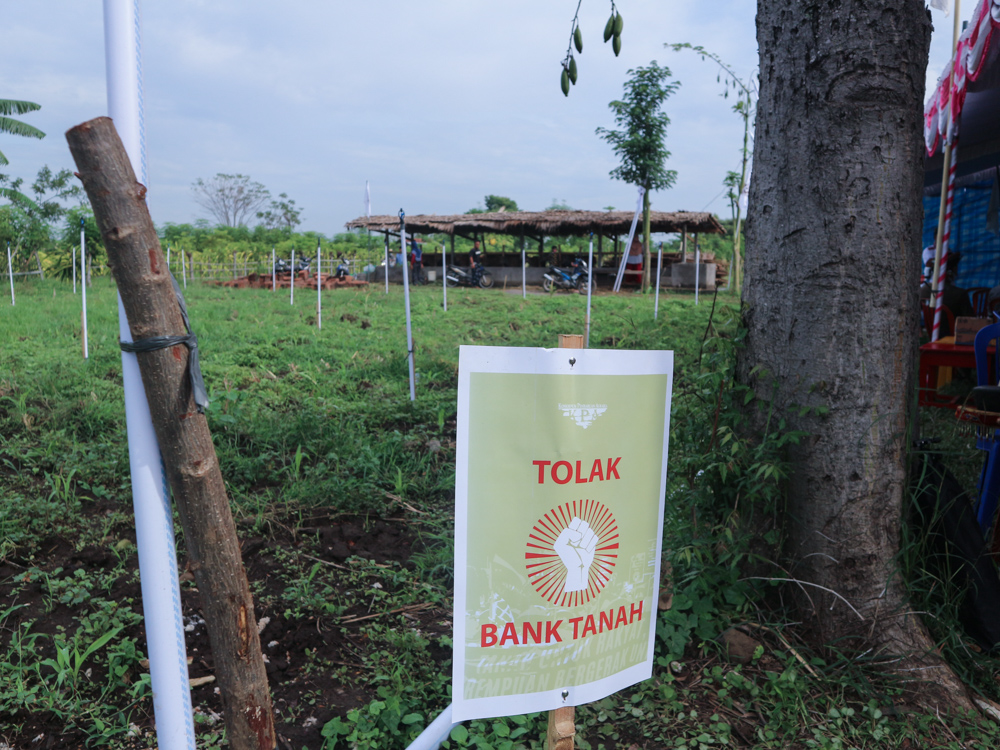
Cows in the middle of collective garden (Foto: Gusti Diah)
For starters, the livestock cooperative consists of ten cows. Later it will be developed and can be helpful for farmers' lives. "Hopefully, this livestock will be able to help the children's school needs, then they can grow and can help other members," hoped Wayan, PIC of the cooperative livestock program from IDEP Foundation.
The components in collective land are an effort to build a permaculture model that farmers on their private lands can later apply. Permaculture is a basic step to free farmers from the green revolution. This trap makes farmers become consumers because it makes them depend on chemical fertilizers, herbicides, pesticides, and buy GMO (genetic engineering) seeds. "The design of the green revolution keeps farmers poor because they have to depend on industry, capitalists," said Roberto.
Implementing permaculture is a step to realize agrarian reform, namely the 'production system' in access reform. So if farmers get the legality of their land, they can manage it properly and sustainably. Then it can realize the goals of agrarian reform, namely the welfare and prosperity of farmers. "Prosperity means releasing farmers from chemical agriculture. This is one that I try through permaculture," added Roberto, who has also assisted SPSM for years to be able to implement sustainable agriculture.
Breaking from the bondage of the chemical agriculture industry means seeking the sovereignty of farmers. For years farmers have been dependent on GMO seeds that are difficult to replant. They can achieve their sovereignty when farmers can produce their seeds for replanting. Fortunately, Sendang Pasir has an abundant variety of local seeds, such as koro, jack bean, catjang, hyacinth bean, velvet bean, corn, and sorghum. "In addition to livestock cooperatives, later farmers here will also be able to produce their seeds," said Wayan.
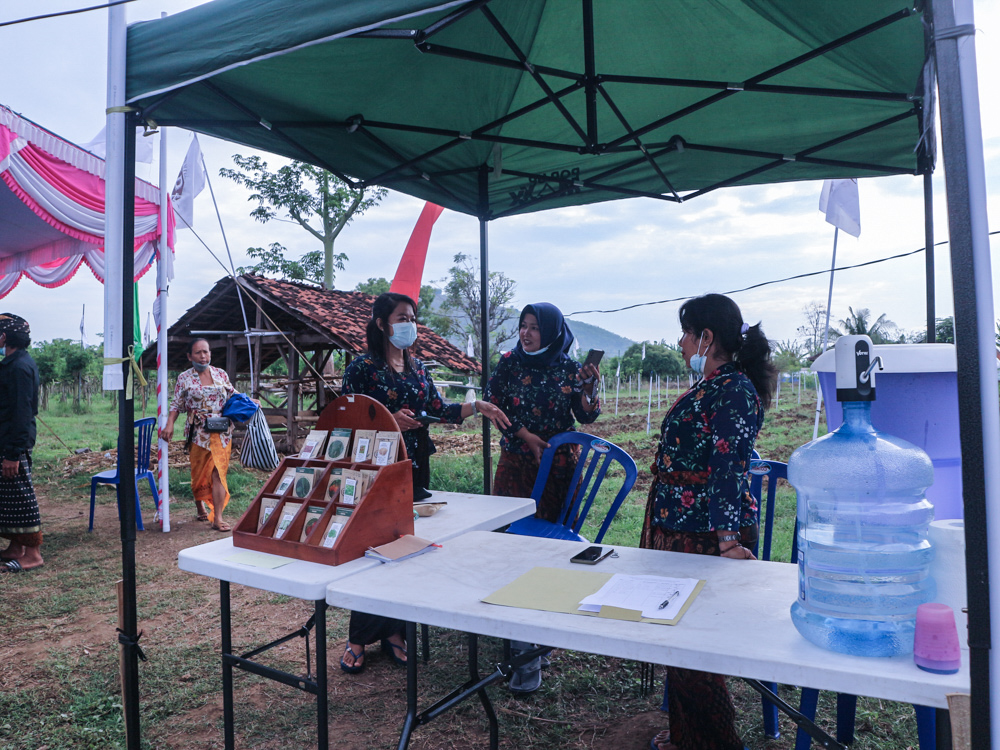
We display our organic seed on National Farmer Day (Photo: Gusti Diah)
To realize the farmers' sovereignty, IDEP also held several meetings with farmers, one of which contained an Integrated Farming Training that covered making organic fertilizers and seed saving. The community welcomed this step because it had a good impact on developing agriculture. Rasik also admitted that "truly, IDEP has encouraged us to live a healthy life because organic doesn't interfere with our health."
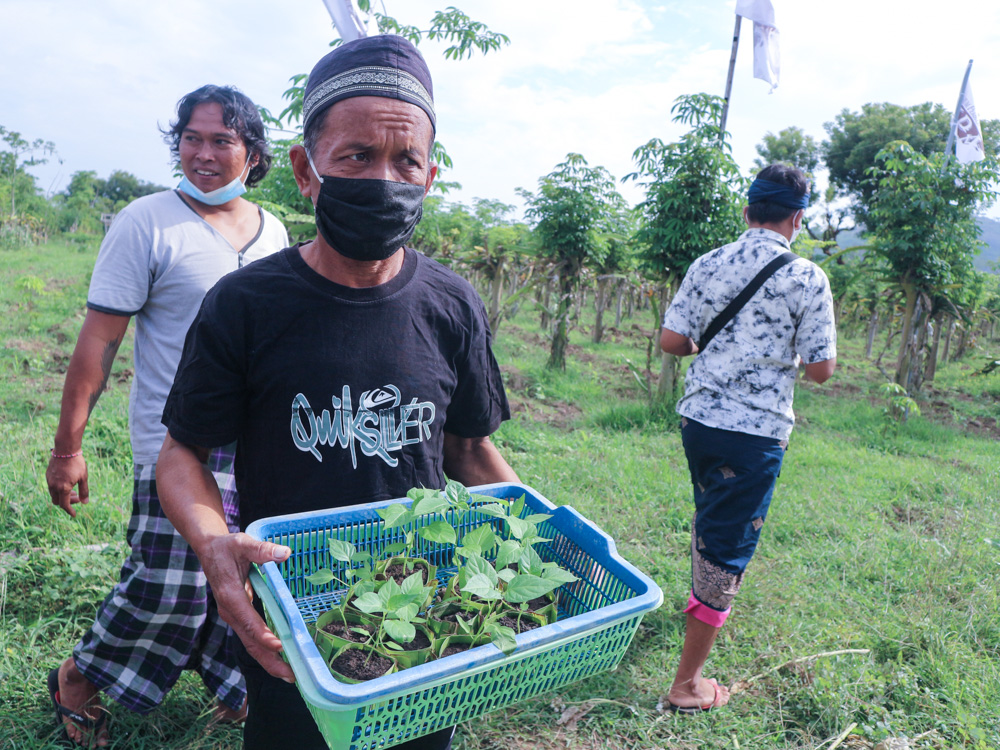
Farmer holds organic seedlings for planting in collective garden (Foto: Gusti Diah)
This Integrated Farming also helps the community to prepare for access reform by building an Agrarian Reform Village (DAMARA). "Because the existence of activities that lead to economic improvement during the struggle for land rights is proofing that farmers are working on and optimizing land use and strengthening the position of farmers in fighting for their rights," said Indrawati.
Therefore, on this National Farmers Day, farmers are also invited to plant local seeds matched with the soil and climate conditions in Pemuteran. SPSM invited village officials and local communities to plant seeds together in their collective garden. They planted seeds of sorghum, chilies, celery, oranges, okra, and many more.
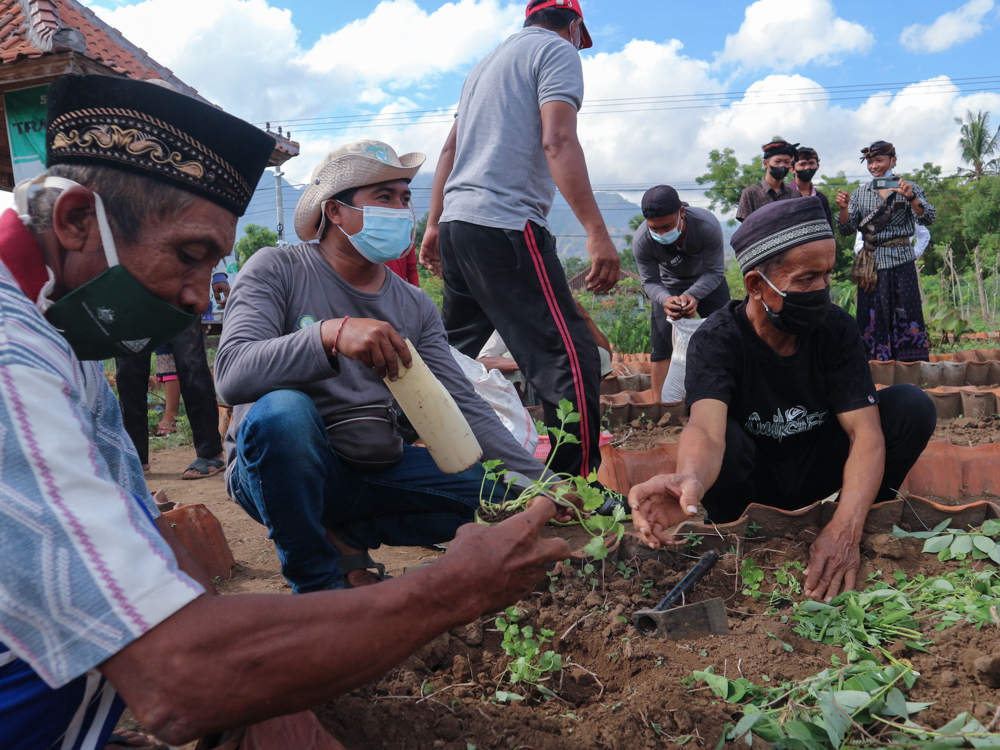
Seedlings planting in collective garden (Foto: Gusti Diah)
Disaster Mitigation through Mangrove Planting
Besides planting in collective gardens, the community in Pemuteran invited to plant mangroves in the coastal area of Pemuteran Village. This planting is an effort to mitigate disaster and educate local youth about the importance of mangroves.
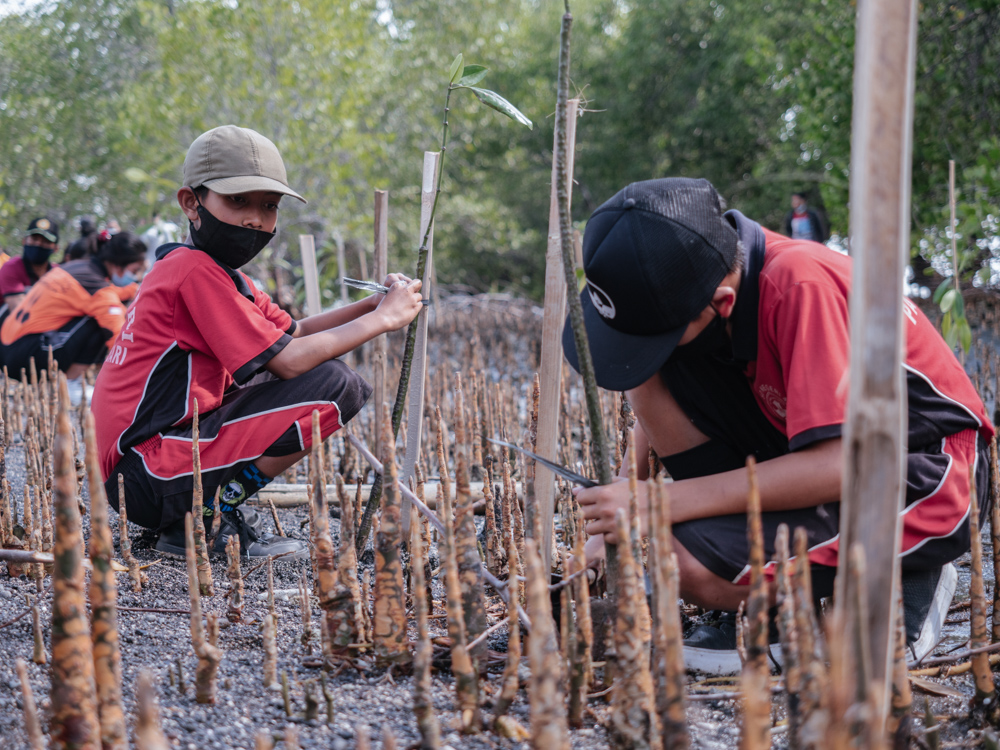
Mangrove planting with students from elementary school in Pemuteran Village (Photo: Prema Ananda)
Communities who live in coastal areas have realized the importance of mangroves to anticipate abrasion. "I've tried many times to plant mangroves here because of the area which had abrasion near my garden," said Putu Agus, a local fisherman and farmer.
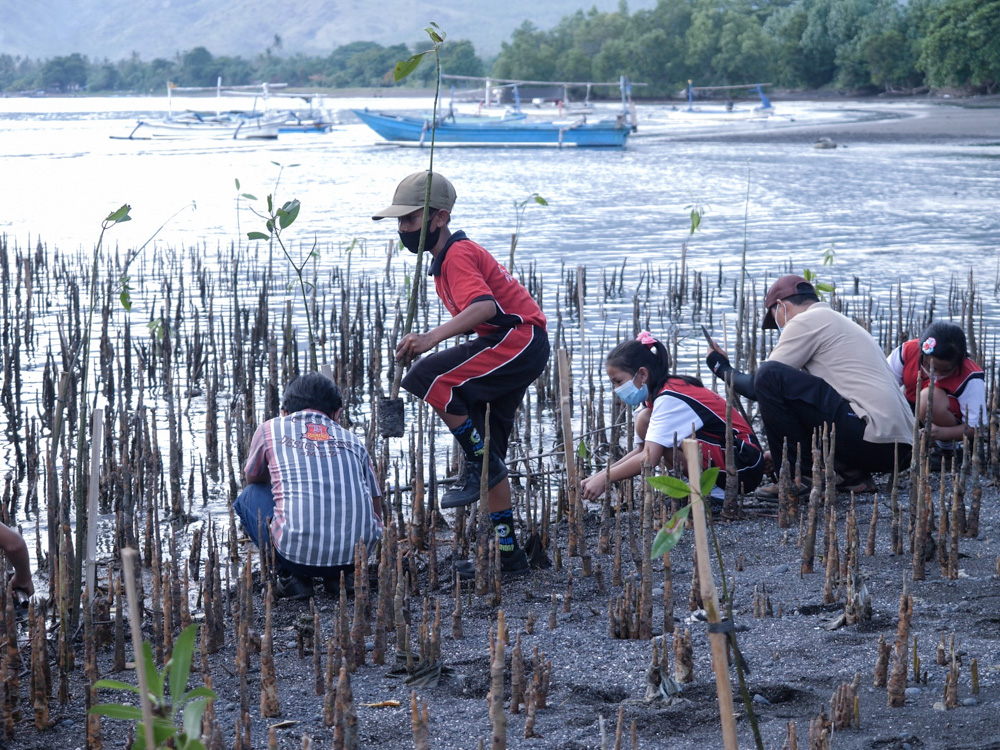
Mangrove planting in costal area, Pemuteran Village (Foto: Prema Ananda)
This mangrove planting also significantly impacts the land safety that the Sendang Pasir community is currently fighting for. Moreover, this conflict area is close to the coast, so it is most threatened by abrasion or tsunami.
Talk about Agriculture in Bali
The story about conflict lands became the beginning of a land issues discussion in Bali. BWP facilitated this discussion through the "Discussion: Agriculture, Water, and Disaster Mitigation." Various elements of society are involved, including farming communities from Sendang Pasir and Sumberklampok, students, and activists.
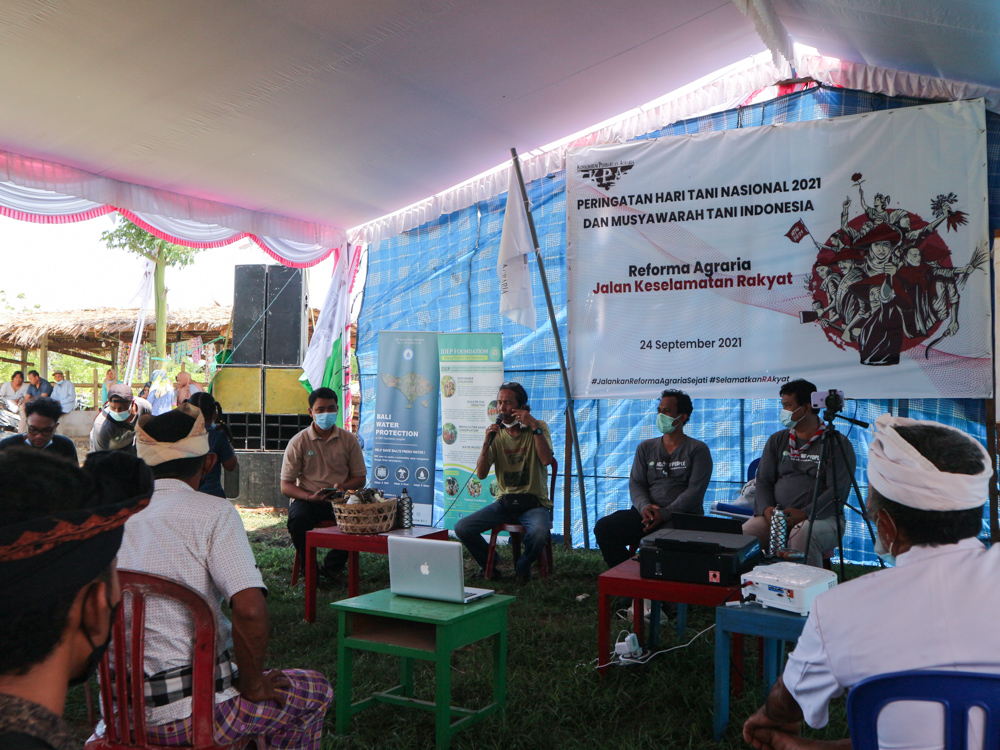
Discussion about Agriculture, Water, and Disaster Mitigation (Photo: Gusti Diah)
This discussion is also carried out online via Zoom, so everyone can involve and also know about the farmers' problems in Bali. The biggest problem is water because agriculture can't run without water. Farmers from Sumberklampok have experienced this problem due to seawater intrusion. "We at Sumberklampok use groundwater for agriculture. Now every time we water the plants, it make plants wilt," said Gede Suryawan, who also asked for solutions.
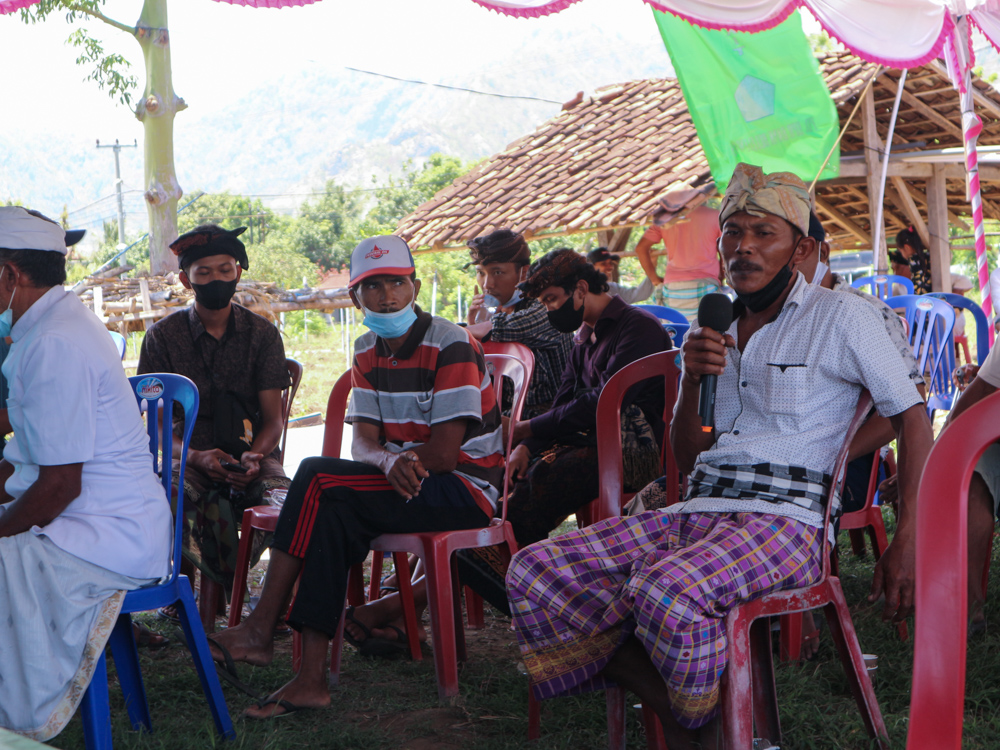
Gede Suryawan tells about his farming experience (Foto: Gusti Diah)
According to research by the BWP research team, Sumberklampok has soil with a high lime content, so seawater can more easily enter the aquifer layer. It makes the groundwater in Sumberklampok salty, or it can be called seawater intrusion.
Putu Bawa also shared one of the solutions that farmers can implement to overcome seawater intrusion. There are two methods, namely the rainwater harvesting system and the filtration method. "Currently, what farmers can do is build a dam to collect rainwater, and later it can use for watering," he said.
This seawater intrusion proves that groundwater conservation is significant for agricultural sustainability because water has a fundamental role. Public awareness began to awaken. So it is necessary to make efforts such as building recharge wells and water-saving behavior. This behavior does not necessarily reduce usage immediately. Especially in agriculture, where the steps can be started from changing the previous pattern, such as changing a watering system that is more effective and efficient or using organic materials that are good for the soil.(Gd)
Subscribe to IDEP Newsletters
Give a gift that will change lives. 100% funds charity projects.
|






